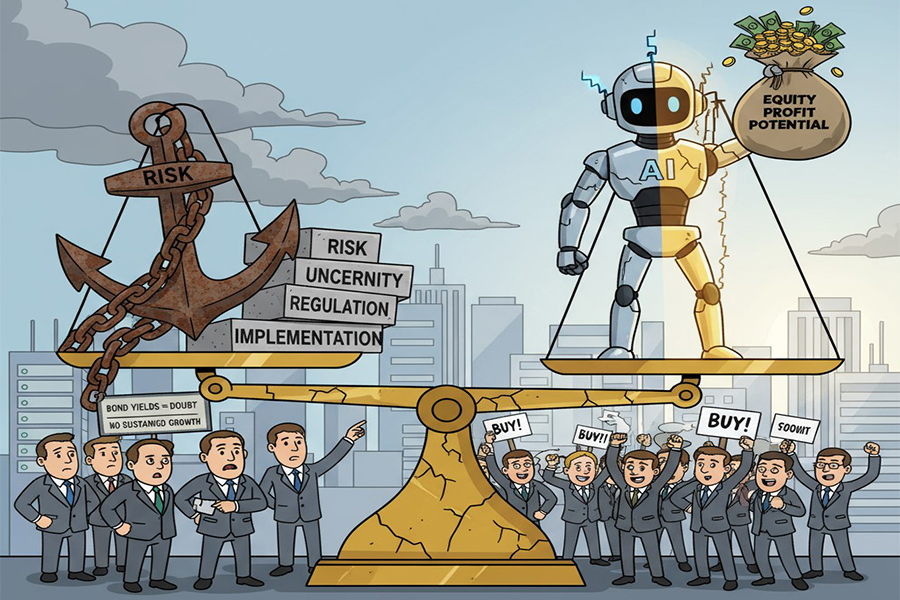
Jan 18 , 2025
By Yana Gevorgyan
This year's annual meeting of the World Economic Forum in Davos, where participants will address the theme of "Collaboration for the Intelligent Age," comes at a critical juncture for the planet. Ecosystems are straining under the pressure of climate change, and the interconnected cycles that maintain freshwater availability, soil moisture, ocean health, and plant growth are spinning out of balance at an alarming pace.
At least 420 million hectares of forest globally have been lost to deforestation since 1990, causing biodiversity loss to accelerate and fuel climate volatility. Freshwater resources have declined so precipitously, owing to rising temperatures, groundwater mismanagement, saltwater intrusion, pollution, land degradation, and increased population density. Demand is predicted to exceed supply by 40pc by 2030. And, wildlife populations in freshwater habitats fell by 85pc between 1970 and 2020.
The paradox is that we continue to degrade the systems that sustain life on Earth despite knowing more about their fragility than ever before. In the search for solutions, we often look to technology – especially artificial intelligence (AI) – as a panacea. But AI alone cannot save the planet. Instead, we should ensure that AI complements, rather than replaces, human capabilities to realise its full potential.
While AI models can identify patterns, they often use incomplete or biased data, and thus lack important context. This is where "augmented intelligence" comes in. Augmented intelligence combines powerful algorithms with human knowledge and lived experience to ensure that these advanced tools account for cultural, economic, and ecological considerations.
For example, Indigenous communities have learned how to manage resources sustainably by tracking nature's cycles and observing the environment for centuries. This expertise can help reveal subtle trends data fail to capture, ensuring that technology serves real-world needs. Using indigenous insights and scientific data has provided a more accurate picture of polar bear populations in Canada's Northwest Territories, while an AI-driven model that factored in such traditional knowledge has helped Inuit communities in the Arctic identify new fishing grounds amid changing climate conditions.
But, indigenous populations are not the only ones with valuable insights. Local communities and private-sector actors, from smallholder farmers to multinational corporations, accumulate site-specific data when responding to droughts, adopting regenerative agriculture practices, investing in biodiversity projects, and decarbonising their supply chains. Sharing this knowledge, which reflects cultural traditions and economic realities and is enriched by human judgment, strengthens the data on which AI models rely.
Humans and machines learn from each other, creating a feedback loop that leads to more effective solutions.
Greater openness encourages trust, accelerating the adoption and refinement of AI tools. Before long, the willingness to share data, insights, and innovations will be seen as a mark of leadership and prestige, rather than a risk. Those who advocate data sharing will facilitate collective progress, demonstrating the cooperation and wisdom needed to guide us toward a safe and healthy planet.
Augmented intelligence should be at the heart of global strategies for biodiversity conservation and climate mitigation and adaptation. Policymakers can take steps to bridge the gap between digital innovators and local environmental stewards. Businesses can align their investments with nature-positive goals and share any resulting knowledge. Innovators can create accessible tools that take into account cultural contexts and input from communities, turning top-down interventions into agile, responsive, and collaborative efforts.
When political leaders and executives convene in Davos, they should acknowledge that technology is not a cure-all for climate change and biodiversity loss. Without human guidance – bolstered by our capacity for empathy, cultural understanding, and ethical reasoning – it will be impossible to unlock AI's potential. In the Intelligent Age, coupling advanced tools with lived experience will enable us to transcend the zero-sum mentality that pits people against machines.
PUBLISHED ON
Jan 18,2025 [ VOL
25 , NO
1290]


Sponsored Contents | Dec 20,2024

Viewpoints | Sep 08,2024

View From Arada | Oct 25,2025

Viewpoints | Jun 24,2023

Commentaries | Oct 16,2020

My Opinion | May 24,2025

Commentaries | Jun 01,2024

Viewpoints | Mar 04,2023

Viewpoints | May 20,2023

Radar | Jul 13,2025

Photo Gallery | 179053 Views | May 06,2019

Photo Gallery | 169251 Views | Apr 26,2019

Photo Gallery | 160125 Views | Oct 06,2021

My Opinion | 137144 Views | Aug 14,2021
Commentaries | Oct 25,2025

Dec 22 , 2024 . By TIZITA SHEWAFERAW
Charged with transforming colossal state-owned enterprises into modern and competitiv...

Aug 18 , 2024 . By AKSAH ITALO
Although predictable Yonas Zerihun's job in the ride-hailing service is not immune to...

Jul 28 , 2024 . By TIZITA SHEWAFERAW
Unhabitual, perhaps too many, Samuel Gebreyohannes, 38, used to occasionally enjoy a couple of beers at breakfast. However, he recently swit...

Jul 13 , 2024 . By AKSAH ITALO
Investors who rely on tractors, trucks, and field vehicles for commuting, transporting commodities, and f...

Oct 25 , 2025
The regulatory machinery is on overdrive. In only two years, no fewer than 35 new pro...

Oct 18 , 2025
The political establishment, notably the ruling party and its top brass, has become p...

Oct 11 , 2025
Ladislas Farago, a roving Associated Press (AP) correspondent, arrived in Ethiopia in...

Oct 4 , 2025
Eyob Tekalegn (PhD) had been in the Governor's chair for only weeks when, on Septembe...

Oct 25 , 2025 . By YITBAREK GETACHEW
Officials of the Addis Abeba's Education Bureau have embarked on an ambitious experim...

Oct 26 , 2025 . By YITBAREK GETACHEW
The federal government is making a landmark shift in its investment incentive regime...

Oct 29 , 2025 . By NAHOM AYELE
The National Bank of Ethiopia (NBE) is preparing to issue a directive that will funda...

Oct 26 , 2025 . By SURAFEL MULUGETA
A community of booksellers shadowing the Ethiopian National Theatre has been jolted b...